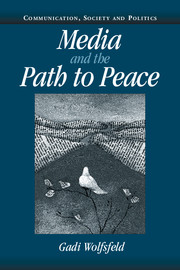Book contents
- Frontmatter
- Contents
- Acknowledgements
- Introduction
- 1 Building theory
- 2 The initial stages of Oslo
- 3 The Israeli media and the debate over Oslo
- 4 The Palestinians and the Israeli media
- 5 The media and the Israel–Jordan peace process
- 6 The media and the struggle for peace in Northern Ireland
- 7 The collapse of Oslo and the return to violence
- Conclusion
- Methodological appendix
- References
- Index
1 - Building theory
Published online by Cambridge University Press: 22 September 2009
- Frontmatter
- Contents
- Acknowledgements
- Introduction
- 1 Building theory
- 2 The initial stages of Oslo
- 3 The Israeli media and the debate over Oslo
- 4 The Palestinians and the Israeli media
- 5 The media and the Israel–Jordan peace process
- 6 The media and the struggle for peace in Northern Ireland
- 7 The collapse of Oslo and the return to violence
- Conclusion
- Methodological appendix
- References
- Index
Summary
Much has been written about the role of the news media in conflict and war, but very little about their role in peace. Searching through the hundreds of studies on peace building and conflict resolution, it is difficult to find even a passing reference to the press. There is not a single major study that has looked at the role of the news media in an ongoing peace process.
This lack of interest in the topic is even more glaring when one considers the tremendous amount written on media and conflict. There are countless articles and books about the role of the media in protests, terrorism, and war in popular and scholarly publications. Why is there such a gap? Considering possible answers to this question provides some initial insights into the general topic of media and peace. Examining some of the reasons why researchers prefer dealing with conflict also tells us something about similar choices made by the news media.
The first reason that comes to mind is that the link between media and conflict is simply more obvious. Conflict and violence are the mainstays of the news industry, whereas stories about peace are few and far between. It is also clear that the media play a significant role in protests and terrorism because the need for publicity is a central component of these strategies. The role of the press in wartime is similarly conspicuous.
Information
- Type
- Chapter
- Information
- Media and the Path to Peace , pp. 8 - 44Publisher: Cambridge University PressPrint publication year: 2004
